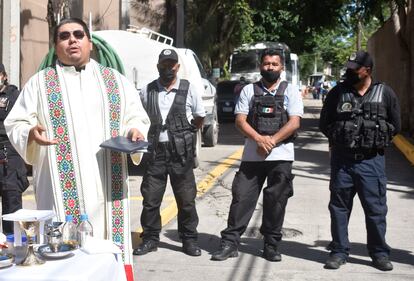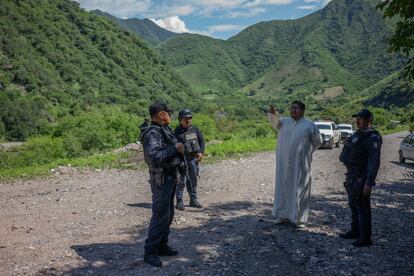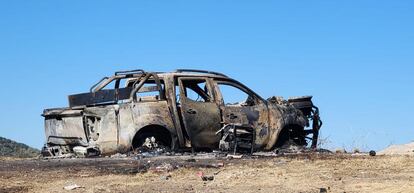Bishops use diplomacy to take on drug crime in Mexico: ‘The Church plays an important role, given the absence of the state’
The truces between criminal organizations in the state of Guerrero appear linked to the Catholic hierarchy, which is willing to mediate in order to stop the wave of violence

In the southwestern Mexican state of Guerrero, the local clergy are making efforts to stop the drug wars, which are responsible for so much death in the region.
Last week, members of the criminal group Los Tlacos murdered at least 12 gunmen from an enemy organization, La Familia Michoacana. The victors recorded their celebration on video: they hurled insults as they shot the corpses and burned them on a pyre. However, just days later, a priest — Father Filiberto Velázquez, who’s familiar with the battle between these groups — announced a truce between them.
Given the massacres, drone strikes and attacks on bus drivers across the state, time will tell if the truce — in practice — actually has staying power. The form in which it was negotiated, however, stands out. The pact wouldn’t have taken place without the intervention of the four bishops of Guerrero, as well as the support of Salvador Rangel — bishop emeritus of the state capital of Chilpancingo — and priests such as Velázquez. This “diocesan realpolitik” goes beyond moral issues or red lines: Guerrero is experiencing a period of extreme violence, and religious people are demanding peace. At whatever price.
For Bernardo Barranco — a sociologist who specializes in contemporary Catholicism — this mediation attempt by the religious authorities isn’t new at all. “You find it in different parts of Latin America,” he explains. “In Nicaragua, for example, before [Daniel] Ortega’s madness, the Church had an important mediating role. In Peru, too, during the years of the Shining Path [insurgency],” he explains. “And [this mediation] doesn’t just take place with common criminals or dissident powers. In Argentina, for example, Bergoglio [Pope Francis] himself negotiated with the dictatorship to protect political prisoners. That is to say, the Church has that mediating spirit on the continent.”

Mexico hasn’t been immune to the mediating nature of the clergy, either. Barranco recalls the case of Nuncio Girolamo Prigione, a member of the Institutional Revolutionary Party (PRI) who was close to former Mexican president Carlos Salinas. In the 1990s, Prigione — a man who was “very interventionist” — met with two of the Arellano Félix brothers, leaders of the Tijuana Cartel, following the assassination of Cardinal Jesús Posadas in Guadalajara. “Then, we had the case of Rangel, who was able to pacify an area during the last elections. And now, we have this group of four bishops. This shows us that, in the absence of authority, the Church plays a supplementary role. In the south of Italy, it’s the same. The absence and complicity of the state when it comes to crime fosters alternative links to the state itself,” argues Barranco.
It’s not known how Los Tlacos and La Familia Michoacana finally reached an agreement this past week. What is known is that its leaders had a conversation through the bishops in mid-January. While that discussion failed, apparently, the talks continued, eventually resulting in a non-aggression pact.
Los Tlacos had killed 12 members of La Familia just days before the truce. And earlier, in January, the latter had killed at least five of members of Los Tlacos, in the mountainous area that separates the municipalities of Heliodoro Castillo — a stronghold of Los Tlacos — and San Miguel Totolapan, under the control of La Familia. Amidst this warfare, it was time to stop.
Father Velázquez points out that religious intervention must be understood as part of a complex process of dialogue and negotiations between groups. The bishops didn’t want to give too many details about the mediation to the press. But they did confirm their intervention, as the head of the Diocese of Chilpancingo — José de Jesús González — surprisingly reported last week. EL PAÍS contacted González for more information, but received no response.

He and his colleagues from the cities of Acapulco, Altamirano and Tlapa met with the leaders of La Familia Michoacana and forced a call with the leader of Los Tlacos. The agreement didn’t happen right there and then, but one week (and one massacre) later, the pact finally came. Los Tlacos and La Familia also reached their truce after the former did the same with another of their rival groups, Los Ardillos. For more than a year, both organizations had been escalating attacks against public transport drivers in the state capital — Chilpancingo — and nearby municipalities. At the beginning of the month — after several bus and taxi drivers were murdered over the course of a few days — the groups finally reached an agreement. In that case, too, the clergy was involved, specifically Velázquez and Rangel.
Other Catholic authorities in nearby regions have also sanctioned similar actions and have revealed their own approaches. This was the case, for example, of the auxiliary archbishop of Toluca, Maximino Martínez. This past week, Martínez said that “all [criminal groups] are summoned. Some come, others don’t. Those who attend are welcome… and, therefore, they’re asked to return and look for the paths to be able to build peace.”
Bernardo Barranco points out a “political overtone” in this wave of interventions by religious figures. “In moments of vulnerability in the system — such as electoral processes — the Church has an important role to play, not only in mediation, but in making demands. The Church historically raises its demands at critical times like these,” he concludes.
Sign up for our weekly newsletter to get more English-language news coverage from EL PAÍS USA Edition
Tu suscripción se está usando en otro dispositivo
¿Quieres añadir otro usuario a tu suscripción?
Si continúas leyendo en este dispositivo, no se podrá leer en el otro.
FlechaTu suscripción se está usando en otro dispositivo y solo puedes acceder a EL PAÍS desde un dispositivo a la vez.
Si quieres compartir tu cuenta, cambia tu suscripción a la modalidad Premium, así podrás añadir otro usuario. Cada uno accederá con su propia cuenta de email, lo que os permitirá personalizar vuestra experiencia en EL PAÍS.
¿Tienes una suscripción de empresa? Accede aquí para contratar más cuentas.
En el caso de no saber quién está usando tu cuenta, te recomendamos cambiar tu contraseña aquí.
Si decides continuar compartiendo tu cuenta, este mensaje se mostrará en tu dispositivo y en el de la otra persona que está usando tu cuenta de forma indefinida, afectando a tu experiencia de lectura. Puedes consultar aquí los términos y condiciones de la suscripción digital.









































